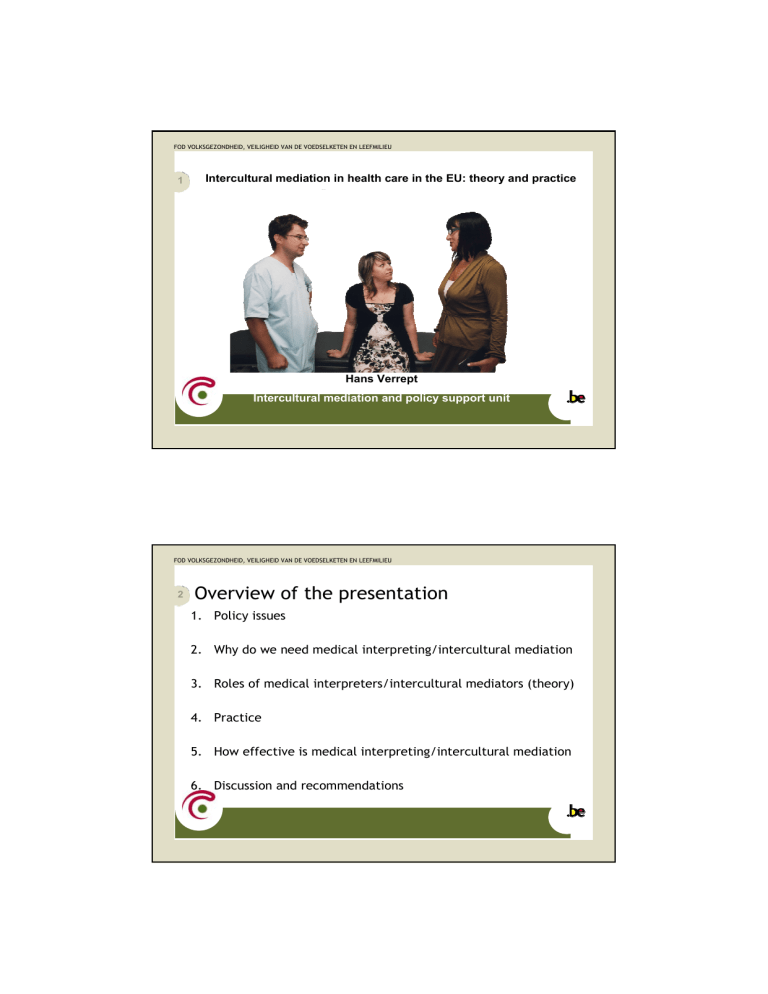
FOD VOLKSGEZONDHEID, VEILIGHEID VAN DE VOEDSELKETEN EN LEEFMILIEU
1
Intercultural mediation in health care in the EU: theory and practice
Hans Verrept
Intercultural mediation and policy support unit
FOD VOLKSGEZONDHEID, VEILIGHEID VAN DE VOEDSELKETEN EN LEEFMILIEU
2
Overview of the presentation
1. Policy issues
2. Why do we need medical interpreting/intercultural mediation
3. Roles of medical interpreters/intercultural mediators (theory)
4. Practice
5. How effective is medical interpreting/intercultural mediation
6. Discussion and recommendations
FOD VOLKSGEZONDHEID, VEILIGHEID VAN DE VOEDSELKETEN EN LEEFMILIEU
3
1. Policy
- Existence of ethnic health care disparities (IOM, 2003)
-Little monitoring of ethnic health care disparities in EU
-Very few needs assessments in the field of medical
interpreting/intercultural mediation
-Large number of projects
FOD VOLKSGEZONDHEID, VEILIGHEID VAN DE VOEDSELKETEN EN LEEFMILIEU
4
- (Very) limited training available for medical
interpreters/intercultural mediators in many countries
- Linguistic needs are often not met
FOD VOLKSGEZONDHEID, VEILIGHEID VAN DE VOEDSELKETEN EN LEEFMILIEU
5
N° of encounters where a language problem
has to be resolved
1.863.750
N° of interventions by
interpreters/intercultu
ral mediators
112.372
(Based upon Van Gucht & Hertog, 2003; Verrept, 2012)
FOD VOLKSGEZONDHEID, VEILIGHEID VAN DE VOEDSELKETEN EN LEEFMILIEU
6
2. Why do we need medical
interpreting/intercultural mediation
- Linguistic barriers
- Socio-cultural barriers
- Ethnic barriers
Who should resolve these barriers?
FOD VOLKSGEZONDHEID, VEILIGHEID VAN DE VOEDSELKETEN EN LEEFMILIEU
7
Views on the roles of medical
interpreters/intercultural mediators
Language-oriented
Translation machine / invisible interpreter
Medical interpreter (NCIHC/IMIA/CHIA)
Intercultural mediator
Co-therapist
Therapy-oriented
FOD VOLKSGEZONDHEID, VEILIGHEID VAN DE VOEDSELKETEN EN LEEFMILIEU
8
What is intercultural mediation?
‘Bridging of the linguistic and cultural gap in communication and
faciltiation of the therapeutic relationship between health
professionals and service users’ (Qureshi, 2011)
‘assists organisations in the process of making services offered to
migrant users appropriate’ (Chiarenza, in Pöchhacker, 2008)
FOD VOLKSGEZONDHEID, VEILIGHEID VAN DE VOEDSELKETEN EN LEEFMILIEU
9
Intercultural mediators may in many projects have one on one
meetings with patients & health care providers
FOD VOLKSGEZONDHEID, VEILIGHEID VAN DE VOEDSELKETEN EN LEEFMILIEU
10
A wider role for the interpreter or intercultural mediation is often
advocated by:
-Experts in medical sociology/antropology (Greenhalgh, 2006)
-Researchers working with non-Western groups (Kaufert & Putsch,
1997; Arnaert, 2006; Verrept, 2008; Deumert, 2010)
-Patients (Green et al, 2005; Nocon, 2003)
-Does one size fit all? (For all groups of patients, care providers?)
FOD VOLKSGEZONDHEID, VEILIGHEID VAN DE VOEDSELKETEN EN LEEFMILIEU
11
4. Practice
What do interpreters / intercultural mediators actually do?
Æ outside the triadic encounter?
Anecdotal evidence
ÆMany interpreters and intercultural mediators alike try to help to
reduce the effects socio-cultural barriers / ethnic barriers
Æ‘We’re human after all’
FOD VOLKSGEZONDHEID, VEILIGHEID VAN DE VOEDSELKETEN EN LEEFMILIEU
12
‘It is time to close the period of interpreters feeling guilty of their
visibility and being traumatized by the fear of taking the initiative
(…)’ (Karlin, 2003)
‘(…)This gives rise to the possibility that the interpreter becomes a
third party in the conversation between patient and provider for a
number of very specific communication and cultural issues. (CHIA,
2002)
FOD VOLKSGEZONDHEID, VEILIGHEID VAN DE VOEDSELKETEN EN LEEFMILIEU
13
FOD VOLKSGEZONDHEID, VEILIGHEID VAN DE VOEDSELKETEN EN LEEFMILIEU
14
5. How effective is medical
interpreting/intercultural mediation
- Review articles by Flores (2005) & Karliner et al. (2007)
-Interventions by professional interpreters are associated with
overall improvement of care
decrease communication errors
increase patient comprehension
improve clinical outcomes
increase satisfaction
- Evidence remains even if effects of ad hoc interpreters are not
separated out
FOD VOLKSGEZONDHEID, VEILIGHEID VAN DE VOEDSELKETEN EN LEEFMILIEU
15
Very few studies on effects of intercultural mediation
(Verrept, 2008; Rocheron et al, 1988)
FOD VOLKSGEZONDHEID, VEILIGHEID VAN DE VOEDSELKETEN EN LEEFMILIEU
16
6. Discussion and recommendations
Medical interpreting and intercultural mediation in health care are
underresearched domains
Existing studies have severe methodological limitations (Flores,
2005; Karliner et al., 2007; Pavlish, 2010)
- mostly American literature
- lack of information on training, tasks executed
- no distinction made between trained vs untrained
interpreters
- small sample size
FOD VOLKSGEZONDHEID, VEILIGHEID VAN DE VOEDSELKETEN EN LEEFMILIEU
17
Lack of clear professional standards for tasks that go beyond
‘interpreting’
Position and role of, in particular, the intercultural mediator may
be unclear to patient and care provider
Still: what is known should encourage policy makers to further
develop interpreting and intercultural mediation services and to
assess them adequately
Æ possible contribution of ethnographic approach
FOD VOLKSGEZONDHEID, VEILIGHEID VAN DE VOEDSELKETEN EN LEEFMILIEU
18
Need for interdisciplinary research published in main stream
medical journals
Use video-conference technology to provide
interpretation/intercultural mediation in health care
FOD VOLKSGEZONDHEID, VEILIGHEID VAN DE VOEDSELKETEN EN LEEFMILIEU
19












